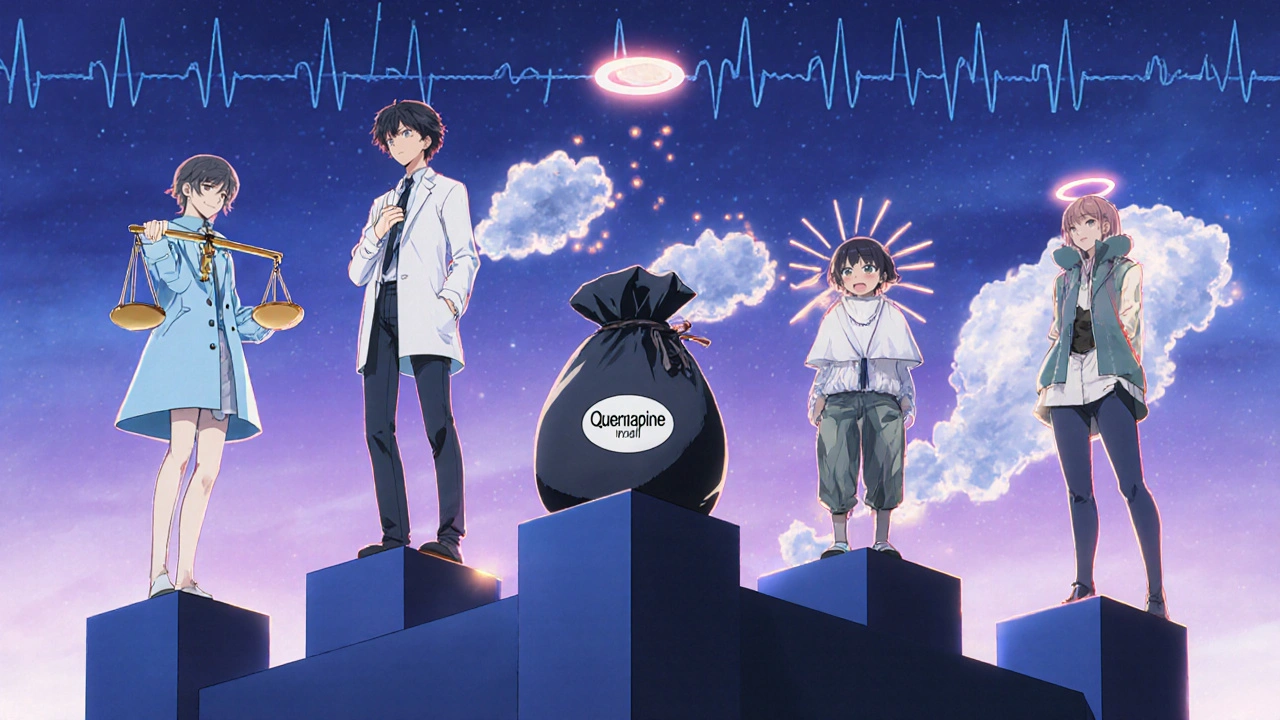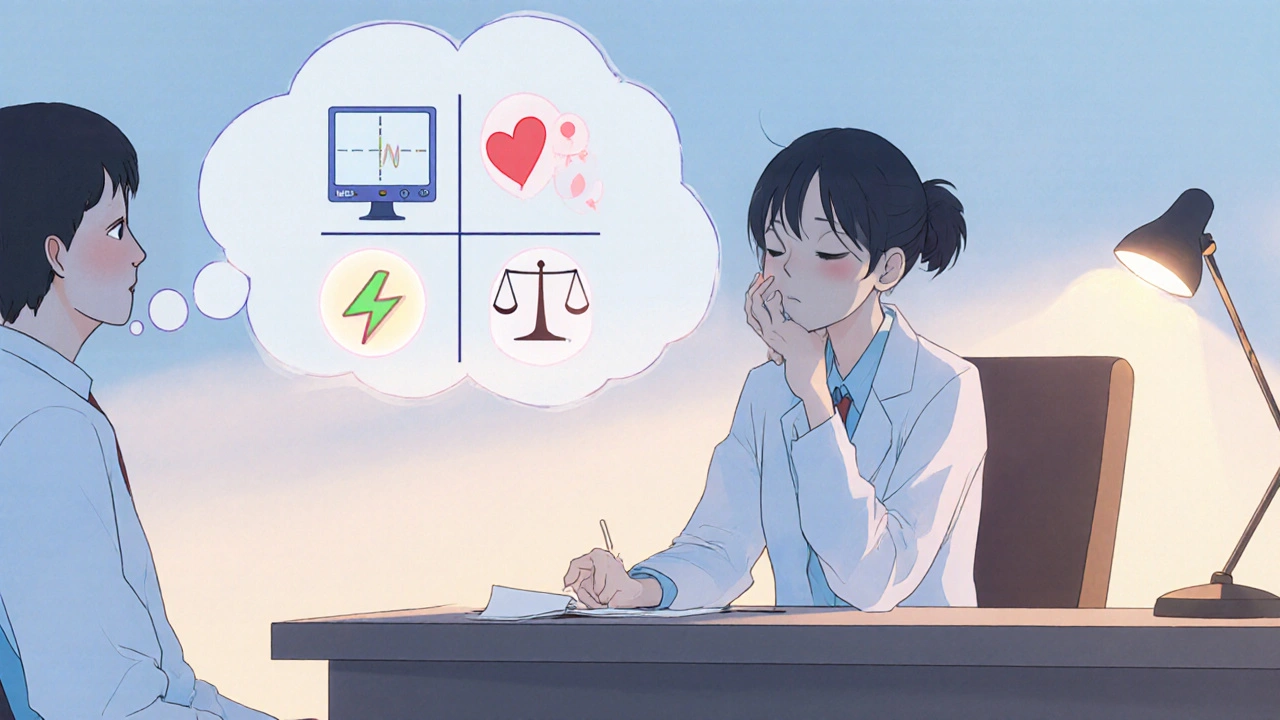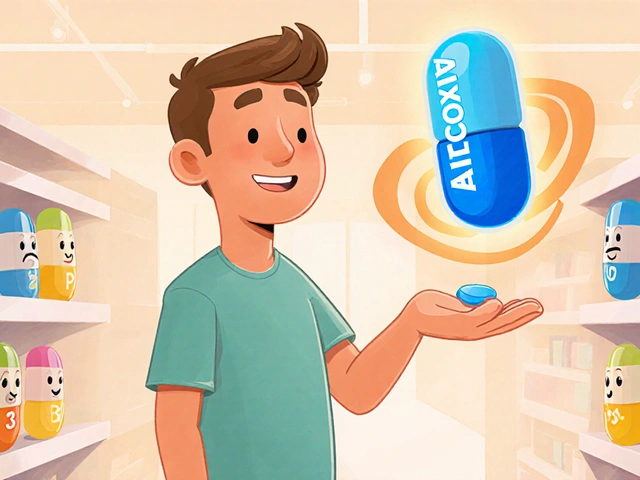Antipsychotic Selection Advisor
Select Your Patient Profile
When a psychiatrist prescribes an antipsychotic, the choice often feels like picking a needle from a haystack. Geodon (ziprasidone) has been marketed as a weight‑neutral option, but how does it really stack up against the other pills sitting on the shelf? This guide walks you through the science, side‑effects, and practical quirks of Geodon and its main rivals, so you can ask the right questions at your next appointment.
What is Geodon (Ziprasidone)?
Geodon (Ziprasidone) is an atypical antipsychotic approved for schizophrenia and acute manic or mixed episodes of bipolar I disorder. It was first FDA‑approved in 2001 and is known for its high affinity for dopamine D2 and serotonin 5‑HT2A receptors, while sparing histamine and muscarinic receptors, which explains its lower sedation and antihistamine side‑effects.
How does Geodon work in the brain?
Geodon blocks dopamine D2 receptors, reducing the over‑activity that fuels hallucinations and delusions. At the same time, it modulates serotonin pathways, helping to balance mood and reduce anxiety. Its metabolism is primarily via the cytochrome P450 enzyme CYP3A4, meaning strong inducers or inhibitors of this enzyme can swing blood levels up or down dramatically. That metabolic route also fuels a common drug‑interaction warning with certain antibiotics and antifungals.
Who typically gets prescribed Geodon?
Patients who are sensitive to weight gain or metabolic disturbances often become candidates for Geodon. Because it’s taken with food-at least 500 kcal per dose-to boost absorption, clinicians also consider a patient’s eating habits. Those with a history of prolonged QT‑interval issues need ECG monitoring, as Geodon can modestly prolong cardiac repolarisation.
Major alternatives: a quick snapshot
The antipsychotic market clusters around a few heavyweight names. Below are the most common alternatives, each introduced with a brief micro‑definition.
Risperidone is a second‑generation antipsychotic widely used for schizophrenia, bipolar disorder, and irritability associated with autism. It is metabolized by CYP2D6 and is available in oral and long‑acting injectable forms.
Olanzapine is an atypical antipsychotic known for strong efficacy but also for notable weight gain and metabolic side‑effects. It has a high affinity for multiple neurotransmitter receptors, including histamine H1.
Quetiapine is a versatile atypical antipsychotic approved for schizophrenia, bipolar depression, and as an adjunct for major depressive disorder. It is sedating and often prescribed at night.
Aripiprazole is a dopamine‑partial agonist antipsychotic that can act as a stabilizer, reducing both psychotic and depressive symptoms. It is metabolized by CYP2D6 and CYP3A4.

Efficacy comparison: what the numbers say
Head‑to‑head trials are scarce, but meta‑analyses give us a rough ranking.
- Symptom reduction: Risperidone and olanzapine consistently show the largest effect sizes on Positive and Negative Syndrome Scale (PANSS) scores, with Geodon close behind.
- Manic episode control: In bipolar mania, quetiapine and aripiprazole often edge out Geodon due to higher potency at serotonin receptors.
- Relapse prevention: Long‑acting injectable risperidone (Risperdal Consta) wins for adherence, while Geodon’s need for food limits its use in some patients.
Bottom line: Geodon is clinically effective for most patients, but it isn’t the absolute strongest performer on any single symptom dimension.
Side‑effect profiles: the deal‑breakers
Side‑effects drive many prescribing decisions. Below we compare the most common concerns.
| Side‑effect | Geodon | Risperidone | Olanzapine | Quetiapine | Aripiprazole |
|---|---|---|---|---|---|
| Weight gain | Minimal (≈1‑2 kg/yr) | Modest (≈3‑4 kg) | High (≈8‑10 kg) | Moderate (≈4‑5 kg) | Low‑moderate (≈2‑3 kg) |
| EPS (tremor, rigidity) | Low | Low‑moderate | Low | Low | Very low |
| Metabolic syndrome | Rare | Occasional | Common | Occasional | Rare |
| QT prolongation | Present (requires ECG in high‑risk) | None | None | None | None |
| Sedation | Low | Low‑moderate | Low‑moderate | High (often taken at night) | Low |
Notice that Geodon’s standout is its weight‑neutral profile, while olanzapine’s potency comes with a heavy metabolic price tag.
Practical considerations: dosing, interactions, cost
Dosage & administration: Geodon is started at 20 mg twice daily with a meal, titrating up to 80 mg twice daily. In contrast, risperidone can be a once‑daily 1‑4 mg dose, and aripiprazole is usually 10‑30 mg once daily.
Drug interactions: Because Geodon leans on CYP3A4, strong inducers like carbamazepine or St. John’s wort can cut its levels, while inhibitors such as ketoconazole can raise them, risking QT issues. Risperidone’s CYP2D6 pathway means poor metabolizers may need lower doses to avoid prolactin elevation.
Cost: As a branded or generic drug, Geodon’s US price hovers around $300‑$350 per month, whereas generic risperidone often falls below $60. Olanzapine’s generic is about $150, quetiapine $140, and aripiprazole $200. Insurance formularies frequently favor the cheaper generics, unless a patient’s specific side‑effect profile dictates otherwise.

Decision guide: which patient fits which drug?
Use the following quick matrix to match clinical scenarios.
- Concern about weight gain or diabetes: Geodon or aripiprazole are first‑line choices.
- Need for rapid symptom control in acute mania: Olanzapine or high‑dose quetiapine often act faster.
- Adherence problems: Long‑acting injectable risperidone can bypass daily pill burden.
- History of cardiac arrhythmia: Avoid Geodon; opt for risperidone or aripiprazole.
- Pregnancy: Risperidone has the largest safety data set; discuss risks with OB‑GYN.
Ultimately, the “best” drug is the one that balances efficacy with tolerability for the individual.
Quick reference table
| Drug | FDA Indications | Typical Dose | Metabolism | Common Side‑effects | Weight Impact |
|---|---|---|---|---|---|
| Geodon (Ziprasidone) | Schizophrenia, Bipolar I mania | 20‑80 mg BID with food | CYP3A4 | QT prolongation, mild EPS | Neutral |
| Risperidone | Schizophrenia, Bipolar, Autism irritability | 1‑4 mg QD | CYP2D6 | Prolactin ↑, EPS low | Modest ↑ |
| Olanzapine | Schizophrenia, Bipolar | 5‑20 mg QD | UGT1A4, CYP1A2 | Sedation, metabolic syndrome | High ↑ |
| Quetiapine | Schizophrenia, Bipolar depression, Adjunct MDD | 150‑800 mg QD (split) | CYP3A4 | Strong sedation, orthostatic hypotension | Moderate ↑ |
| Aripiprazole | Schizophrenia, Bipolar, Adjunct MDD | 10‑30 mg QD | CYP2D6, CYP3A4 | Akathisia, mild EPS | Low‑moderate ↑ |
Frequently Asked Questions
Can I switch from another antipsychotic to Geodon safely?
Yes, but you should taper the previous drug over 1‑2 weeks while introducing Geodon at a low dose. A psychiatrist will monitor for withdrawal symptoms, EPS, and ECG changes during the transition.
Why does Geodon need to be taken with food?
Food, especially a meal containing at least 500 kcal, boosts ziprasidone’s oral bioavailability from ~60 % to >90 %. Without food, blood levels may fall below therapeutic range, risking relapse.
Is Geodon suitable for elderly patients?
It can be used, but start at the lowest dose and monitor QT interval closely, as older adults have higher baseline cardiac risk.
How does the cost of Geodon compare to its alternatives?
Geodon’s brand price is roughly $300‑$350 a month in the U.S., while generic risperidone is under $60. Olanzapine, quetiapine, and aripiprazole sit between $140‑$200. Insurance formularies often favor the cheaper generics unless a specific side‑effect profile justifies Geodon’s expense.
What should I do if I miss a Geodon dose?
Take the missed dose as soon as you remember, but if it’s less than 6 hours later, skip it and resume the regular schedule. Doubling up can increase QT‑prolongation risk.
Choosing the right antipsychotic is rarely a one‑size‑fits‑all decision. By weighing efficacy, side‑effects, dosing convenience, and price, you and your doctor can land on the medication that feels like a fit rather than a compromise.




Kathrynne Krause
October 21, 2025 AT 16:53Hey folks, if you’re hunting for an antipsychotic that won’t add a few extra pounds to the battle, Geodon’s weight‑neutral reputation is a real bright spot. It’s worth flagging this to your psychiatrist, especially if metabolic health is a top priority. Remember, the drug still needs a hearty meal to hit the bloodstream, so plan your dosing around your eating schedule.
Chirag Muthoo
October 26, 2025 AT 07:00Geodon’s absorption is markedly enhanced when administered with a meal containing at least 500 kilocalories, elevating bioavailability from approximately 60 % to over 90 %. Its elimination is predominantly hepatic via CYP3A4, rendering concomitant enzyme inducers or inhibitors clinically significant.
Dana Yonce
October 30, 2025 AT 22:06👍 Geodon can cause a slight QT stretch, so if you have heart issues get an ECG check before staying on it.
Lolita Gaela
November 4, 2025 AT 13:13Geodon is an atypical antipsychotic whose pharmacodynamic profile revolves around high affinity antagonism at dopamine D2 and serotonin 5‑HT2A receptors.
This dual activity contributes to its efficacy in both positive and negative symptom domains of schizophrenia.
Unlike many contemporaries, its antagonism of histamine H1 and muscarinic receptors is relatively weak, accounting for the lower sedation burden.
The drug’s oral bioavailability, however, is markedly food‑dependent, surging to over 90 % when taken with a meal exceeding 500 kilocalories.
In the absence of adequate nutrition, plasma concentrations may fall below therapeutic thresholds, precipitating suboptimal control.
Metabolically, ziprasidone undergoes extensive hepatic oxidation via the cytochrome P450 isoform CYP3A4.
Consequently, potent inducers such as carbamazepine or St. John’s wort can diminish serum levels, whereas strong inhibitors like ketoconazole may elevate concentrations and increase the risk of cardiac adverse events.
Its renal excretion is minimal, rendering dose adjustments unnecessary in mild-to-moderate renal impairment.
A notable safety consideration is its propensity to modestly prolong the QT interval, a phenomenon observed in a dose‑dependent manner.
Regulatory guidance recommends baseline and periodic ECG monitoring for patients with a history of arrhythmia, electrolyte abnormalities, or concomitant QT‑prolonging agents.
From a clinical standpoint, the need for twice‑daily dosing can affect adherence, particularly in populations with irregular meal patterns.
Nevertheless, the drug’s weight‑neutral profile makes it attractive for individuals vulnerable to metabolic syndrome.
Comparative trials have shown that while Geodon’s efficacy is comparable to risperidone and olanzapine in PANSS reduction, it does not surpass them in any singular efficacy domain.
Side‑effect incidence for extrapyramidal symptoms remains low, aligning it with aripiprazole in tolerability.
Cost considerations are non‑trivial, as branded formulations can approach $350 per month, although generic versions have narrowed the gap.
Ultimately, prescribing Geodon requires a balanced assessment of metabolic advantages against cardiac monitoring obligations and patient lifestyle factors.
Rachel Valderrama
November 9, 2025 AT 04:20Wow, dropping $300 a month on a pill that just wants you to eat a big dinner? That’s the kind of budget‑friendly plan every psychiatrist dreams about. If you enjoy paying premium for the “no‑weight‑gain” brag, go right ahead.
Brandy Eichberger
November 13, 2025 AT 19:26My dear interlocutors, whilst the financial outlay for Geodon may appear ostentatious, one must weigh-pun intended-the nuanced trade‑off between metabolic thrift and fiscal prudence. In the grand tapestry of psychopharmacology, such considerations are hardly trivial.
Eli Soler Caralt
November 18, 2025 AT 10:33🤔 ever think that picking a med is like choosing a partner? you want the one that won’t make you heavy‑hearted, yet you gotta feed it right. geodon yeah… it’s the minimalist lover, low‑cal, low‑weight‑gain, but watch that QT‑line, it’s a fragile heart‑string. life’s a dose‑schedule, fam.
Eryn Wells
November 23, 2025 AT 01:40🌟 remember, nobody has to navigate these choices alone! if the cost of Geodon feels steep, chat with your provider about patient‑assistance programs – they exist and can lift that burden.
Angela Koulouris
November 27, 2025 AT 16:46Stay steady with your treatment plan, and keep a food log to make sure you’re hitting that 500‑kcal threshold. Consistency will help you gauge how Geodon truly feels in your day‑to‑day life.
Kimberly Lloyd
December 2, 2025 AT 07:53Consider the medication as a stepping stone rather than a cage; Geodon’s modest side‑effect profile can free you to focus on personal growth, provided you honor the dosing ritual. Optimism about progress fuels recovery.
Sakib Shaikh
December 6, 2025 AT 23:00Listen up! most docs forget that Geodon’s half‑life is only about 7 hours, so missing a dose can swing you into a relapse spiral faster than a roller‑coaster drop. you gotta be on top of that schedule or risk the whole therapy crumble.
Devendra Tripathi
December 11, 2025 AT 14:06Sure, everyone loves the hype about weight neutrality, but let’s not ignore the fact that QT prolongation can be a silent killer. If you have any cardiac risk factor, steer clear of Geodon like it’s a landmine.
Vivian Annastasia
December 16, 2025 AT 05:13Oh great, another “miracle” pill that demands a gourmet meal and an ECG. Because what we really needed were more hoops to jump through.
John Price
December 20, 2025 AT 20:20If you miss a Geodon dose, take it within 6 hours; otherwise skip and continue as scheduled.